2014秋七年级英语上册Unit 9练习同步习题精讲(人教版)(7)正式版
- 格式:ppt
- 大小:891.50 KB
- 文档页数:11
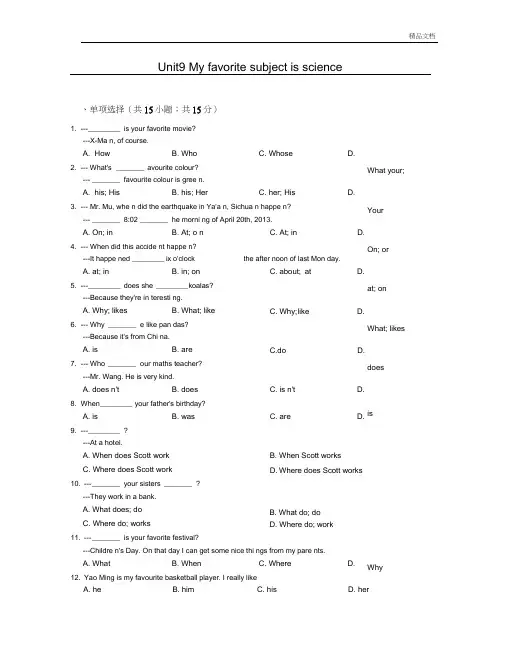
Unit9 My favorite subject is science、单项选择(共15小题;共15分)1. --- ________ is your favorite movie?---X-Ma n, of course.A. HowB. WhoC. WhoseD.2. --- What's _______ avourite colour?--- _______ favourite colour is gree n.A. his; HisB. his; HerC. her; HisD.3. --- Mr. Mu, whe n did the earthquake in Ya'a n, Sichua n happe n?--- _______ 8:02 _______ he morni ng of April 20th, 2013.A. On; inB. At; o n 4. --- When did this accide nt happe n?---It happe ned ________ ix o'clockA. at; inB. in; on5. ---________ does she ________ k oalas?---Because they're in teresti ng.A. Why; likesB. What; like 6. --- Why _______ e like pan das?---Because it's from Chi na.A. isB. are 7. --- Who _______ our maths teacher?---Mr. Wang. He is very kind.A. does n'tB. does 8. When ________ your father's birthday?A. isB. was9. ---________ ?---At a hotel.A. When does Scott work C. Where does Scott work10. --- _______ your sisters _______ ?---They work in a bank.A. What does; do C. Where do; works11. --- _______ is your favorite festival?---Childre n's Day. On that day I can get some nice thi ngs from my pare nts.A. WhatB. WhenC. WhereD.12. Yao Ming is my favourite basketball player. I really likeA. heB. himC. hisD. herC. At; inD. the after noon of last Mon day.C. about; atD. C. Why; l ike D.C.doD. C. is n't D. C. areD. B. When Scott works D. Where does Scott worksB. What do; doWhat your;Your On; orat; onWhat; likesdoesisWhyD. Where do; work13. There was _______ earthquake _______ :46pm _________ arch 11th, 2011.A. a; at; inB. an; in; onC. an; at; onD. a; in; on14. --- When did the earthquake in Lusha n happe n?---It happe ned _______ :02 _______ he morni ng of April 20, 2013.A. on; inB. at; inC. at; onD. on; on15. Why _______ h e like koalas?A. isB. areC. doD. does二、单词拼写(单句首字母填空)(共15小题;共15分)16. --- What is your favourite subject?---It's s _______ .17. Our g _______ t eacher is Mr. Lu. He tells us some interesting places(地方).18. China is a cou ntry with a very long h ______ 「19. M _______ i s the sec ond day of a week.20. It's F ________ t oday.21. In wester n cou ntries, people thi nk Sun day is the beg inning of a week, and S ____ e last day ina week.22. The third day of the week, T _______ is betwee n Mon day and Wedn esday.23. Today is W ______24. The In ter net is beco ming very u _____ r Ian guage lear ning.25. T _______ i s the fifth day of a week.26. There are four s _______ l abs in the build ing.27. G _______ i s my favourite subject. I can lear n more about mountains and rivers.28. Do you know the h ______ f the basketball?29. Tuesday comes after M _______30. F _______ i s the sixth day of a week.三、单词拼写(根据中文提示拼写单词)(共15小题;共15分)31. If you learn even a little English, you will find it (有用的).32. He _______ (完成)his homework at 6 p.m. every day.33. John looks ______ (酷的)in the new windbreaker.34. Miss Ya ng likes readi ng on S _____ U 星期日).35. Today we have six ______ (课).36. Jack's father is ________ (空闲的)only on Sun day.37. Her favourite _______ C 科目)is physics.38. New ________ (科学)can change the world quickly today.39. Do you know the _______ 历史)of your country?40. We have two ______ (地理)classes every week.41. The boy's birthday is next _______ C 星期六).42. We'll have a football match on ______ 星期五)after noon.43. I like ______ (星期二)because P.E. is on that day.44. --- Paul, what day is today?---It is ________ (星期三).45. Mark Twai n is Mary's _______ uthor.四、完形填空(共10小题;共15分)It's 3:15 p.m. now. Class is over. Some stude nts are in the 46 . Look! Lucy is 47 a picture onher desk. Tom and Peter are 48 about a movie. Betty is si nging a 49 at the back of the classroom.50_ is Ann doing? She is making a card. 51 is Helen? She is cleaning the blackboard.Can you see Jim? He is on the 52 . He is play ing 53 basketball with his frie nds. Some girls五、阅读理解(共17小题;共34分)are 54 the playgrou nd, too. They are dancing. Oh, it's time 55 the n ext class. They are running to their classroom.46. A. gym B. library C. classroomD. hall47. A. draw ing B. read ing C. liste ning D. maki ng48. A. say ing B. speak ing C. telli ng D. talki ng49. A. picture B.song C. letter D.book50. A. Where B. What C. How D. Who51. A. How B. When C. Where D. What52. A. playgro und B. gym C. lab D. classroom53. A. a B. an C. the D. /54. A. in B. on C. at D. of55. A. to B. to has C. for D. for haveAI am having a good time in the new school. The new school is big and beautiful. The teachers are friendly to us. My life here is colourful and very interesting. Every day we have lots of things to do at school. We have many differe nt classes, such as maths, scie nee and art. I like art best. We have the En glish corner on Wedn esday after noon. After school, we have many activities, such as play ing basketball, chess and tennis. We can also draw pictures, sing songs and dan ce. Every day, I feel very happy.56. The writer's favourite subject is ______ _A. mathsB. scie neeC. En glishD. art57. Stude nts can go to the En glish cor ner on ______A. Wedn esday after noonB. Saturday morni ngC. Wedn esday morni ngD. Saturday after noon58. What does the writer think of his school life every day?A. Busy.B. Bori ng.C. Won derful.D. Surpris ing.59. What's the best title of the passage?A. My Best Teachers and Frie ndsB. My Favourite SubjectsC. My Favourite ActivitiesD. My Colourful School LifeThe students were having their chemistry class. Miss Li was telling the children what water was like. After that, she asked her stude nts, "What's water?" No one spoke for a few min utes. Miss Li asked aga in, "Whydon't you an swer my questi on? Didn't I tell you what water is like?"Just the n a boy put up his hand and said, "Miss Li, you told us that water has no color and no smell. But where to find such kind of water? The water in the river behind my house is always black and it has a bad smell." Most of the childre n agreed with him."I'm sorry, children," said the teacher, "Our water is getting dirtier and dirtier. That's a problem."60. The stude nts were hav ing their ______ l ass.A. En glishB. Chin eseC. chemistryD. maths61. Miss Li was telli ng the childre n what ______ s like.A. waterB. airC. earthD. weather62. A boy said, "The water in the river beh ind my house is always _______A. whiteB. blackC. clea nD. clear63. Most of the childre n _______ e boy.A. agreed withB. wrote toC. laughed atD. were angry with64. The water in the river has color and smell because it is gett ing ______ .A. more and moreB. less and lessC. clea ner and clea nerD. dirtier and dirtierCIt's Tuesday, August 13th. It's Mary's birthday. They get up early and go to a big city by bus. Mary's mother wants to buy her a birthday gift in the city. They see many clothes stores and hotels there. They come to a clothes store first. Mary's mother buys a red skirt for Mary as a gift. Mary likes it very much.Then they go to a food store. There they buy some chicken hamburgers. Then they go to Green Hotel.They go to see Mary's uncle. He works in the hotel. Green Hotel is a big hotel with one hundred and twenty rooms. Each room is very nice. Mary has a good time in the hotel.65. Mary and her mother go to the city _______ _A. on footB. by busC. by bikeD. b y car66. They first go to in the city.A. a food storeB. a clothes storeC. a hotelD. a restaura nt67. What gift does Mary's mother give her?A. Some chicke n hamburgers.B. A red skirt.C. A birthday cake.D. Some books.68. Green Hotel has rooms.A. 100B. 110C. 112D. 12069. Which of the following is TRUE according to the passage?A. Mary's birthday is on Thursday.B. They go to the city in the after noon.C. They have lunch in a big restaura nt.D. Mary's uncle works in Green Hotel.DAt midni ght on New Year's Eve, people in Rome, Italy, throw out all the things they no lon ger want.The streets are filled with old chairs, beds, clothes and dishes. In Madrid, Spain, the new year comes in more quietly. People come to the main square. Each holds a bag of grapes. As the clock strikes twelve, the people eat the grapes---one for each stroke.In Tokyo, capital of Japan, people eat noodles on New Year's Eve. This food is said to bring long life. Early the n ext morning, some Japa nese families climb Mount Fuji. There they watch the first sun rise of the new year.70. The writer thi nks New Year's Eve in Rome is ______ .A. quietB. dullC. no isyD. bori ng71. The n umber of grapes that must be take n from each bag is _____A. oneB. twelveC. thirtee nD. fourtee n72. People in both Spain and Japa n bring in the new year by ______ 」A. throwi ng things awayB. eat ing a special foodC. climb ing a mountainD. watch ing the first sun rise六、阅读与表达(判断式)(共5小题;共10分)A shop owner(所有者)closed his shop and went home. He was very tired but just as he went to bed the teleph one rang. A man asked, "What time do you ope n your shop?" The shop owner was un happy about this phone call. He put down the receiver without answering and went upstairs to bed. A few minutes later the teleph one rang once aga in and the man asked the same questi on. The shop owner became very angry and he shouted, "You n eed n't ask me whe n I ope n the shop for I won't let you in..." "Oh, no. I don't want to get in," the man said. "I want to go out."根据短文内容,判断正误,正确的为T,错误的为F。
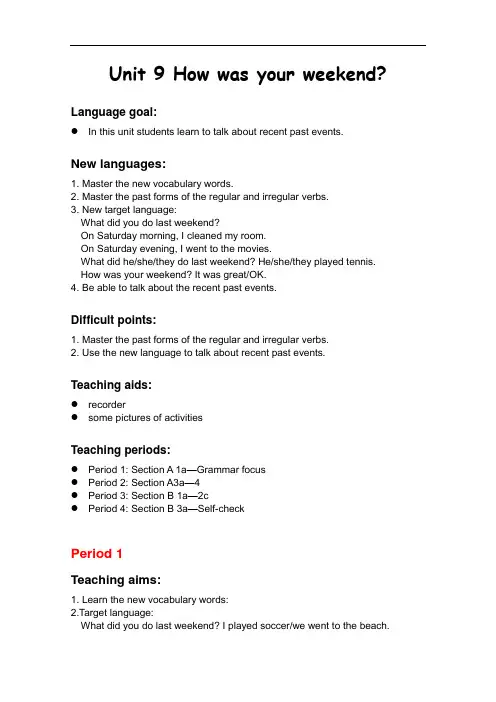
Unit 9 How was your weekend?Language goal:●In this unit students learn to talk about recent past events.New languages:1. Master the new vocabulary words.2. Master the past forms of the regular and irregular verbs.3. New target language:What did you do last weekend?On Saturday morning, I cleaned my room.On Saturday evening, I went to the movies.What did he/she/they do last weekend? He/she/they played tennis. How was your weekend? It was great/OK.4. Be able to talk about the recent past events.Difficult points:1. Master the past forms of the regular and irregular verbs.2. Use the new language to talk about recent past events.Teaching aids:●recorder●some pictures of activitiesTeaching periods:●Period 1: Section A 1a—Grammar focus●Period 2: Section A3a—4●Period 3: Section B 1a—2c●Period 4: Section B 3a—Self-checkPeriod 1Teaching aims:1. Learn the new vocabulary words:2.Target language:What did you do last weekend? I played soccer/we went to the beach.What did he do last weekend? He played tennis.What did they do last weekend? They visited the library.3. Master the past forms of the regular and irregular verbs.4. Learn to talk about recent past events.Teaching procedures:Step 1. Warm-upTalk about the activities:—What’s your favorite sport?—My favorite sport is…—Do you play soccer/tennis/basketball? Yes/no…—Do you do your homework/clean your room? Yes/no...Ask and answer more activities.Step 2. Learn the new vocabulary words1. Get the students to read the new words in the vocabulary. Try to readthem by themselves.2. Practice reading the new words: (A) Ask the class to repeat the newwords after the teacher. (B) Then read them together/in parts/one by one.3. Read and remember the new words.4. Explain some words:The past forms of some irregular verbs: was; did; wentUseful expressions: have a test; stay at home; what about=how about;practice doing sth.Step 3. Presentation1. Teacher asks students: “What did you do last weekend?” Help thestudents to answer the question with the past tense. For example: Icleaned my room/ washed the clothes/played basketball/went to themovies… Accept one word answers and rephrase the answers incompleted sentences.2. Have the students work in pairs, ask the question. And try to answerwith complete sentences. Then practice asking and answering theconversation.Step 4. 1a Look and match1. The teacher reads the instructions to the students.2. Have students read the list of the activities first. Read each one and askstudents to repeat.3.Then look at the pictures and try to match the answers.4. Check up the answers.Step 5. 1b Listening practice1. The teacher reads the instructions to the students.2. Get the students to look at the pictures, and then tell what the person didin each picture inactivity1a.3. Play the recording for the first time, students only listen.4. Play the recording again. Students listen to the recording, try to fill in theday and “morning, afternoon, evening” by themselves.5. Check up the answers.6. Play the recording, let the students repeat after the recording. Thenpractice reading the conversation.Step 6. 1cPair work1. The teacher explains the instructions to the students.2.Ask two students to read the example conversation in class.3. Roles play the conversation about Lucy’s weekend in pairs.4. Have some pairs of students work to the class.Step 7. 2a Listening practice1.The teacher explains the instructions to the students.2. Get students to read the sentences in activity 2a. And explain: “You willhear a conversation. The people will talk about some activities and people. Now listen and try to underline the words you hear.3. Play the recording for the first time, students only listen.4. Play the recording again, students listen and try to underline the words.5. Check up the answers.Step 8. 2b Listening practice1. The teacher explains the instructions to the students. Look at the picturein activity 2a, learn the names of Carol; Ben and Emma. Ask students to identify each person by name.2. Look through the sentences in activity 2a.3. Play the recording. Listen and try to fill their names in the blanks.4. Listen again and check up the answers.5. Play the recording and get students to repeat after the recording.Step 9. 2cPair work1. The teacher explains the instructions to the students. Practice theconversation with the words given in the box.2. Students read the example and the words in the box. Do the activity inpairs and make their conversation.3.Ask some pairs to present the conversations in class.Step 10.Grammar focusReview the grammar box first. Then students read the sentences and find if there are some questions. If have, explain them: the past forms of theregular verbs and irregular verbs.Step 11. Summary1. The new vocabulary words.2. The new target language.3. The regular and irregular verbs.Step 12.Homework1. Remember the vocabulary words.2. Write a passage about your last weekend by using the past tense.Period 2Teaching aims:Learn to talk about the past events using the past tense.Teaching procedures:Step 1. Warm-up1. Check up the homework.2. Get some students to read their passages about the past events.3. Talk about your last weekend in pairs.Step 2. Presentation1. Show the picture of a mountain. Teach the word “mountain”.Have the students read the word.2. Make a conversation between the teacher and the students.For example: T: How was your weekend?S: It was great/OK/ not very good.T: What did you do last weekend?S: I…3. Then practice the conversation.Step 3. 3a Writing and speaking practice1. The teacher reads the instructions to the students.Get the students to read three sentences first.2. Students look at the picture and complete the conversation bythemselves.3. Check up the answers.4. Practice the conversations in pairs.Step 4. 3b Pair work1. The teacher reads the instructions to the students.2. Get two students to read the conversation in speech bubbles.3. Practice asking and answering the questions about Ming’s, Tony’s andSarah’s weekends. Practice in pairs.A: How was Ming’s weekend?B: It was …A: What did she do?B: She …4. Have some pairs work in class.Step 5.Game-What did you do?1. Teacher explains the instructions to the students. Be sure the studentscan know what to do.2. Do an example for the students.Draw a picture of a TV, students guess “watched TV”.Draw a picture of a book, studen ts guess “did some reading”.3. Ask students to work in groups. Each student draws two things.Then take turns to make sentences about each other’s picture with pasttense.4. Get some students to work it to the class.Step 6.Summary●Talk about the past events.Step 7.Homework●Interview a friend of yours, ask what he/she did last weekend and write apassage on your notebook.Period 3Teaching aims:1. Learn the new vocabulary words and useful expressions.2. Learn the past forms of some irregular verbs.3. Learn to talk about the past events.Teaching procedures:Step 1.Warm-up1. Check up the homework.2. Get some students to read their passages about what your friend did lastweekend.Step 2. 1a 1b Match and say1. Get the students to look at the pictures, read the phrases and try tomatch.2. Look at the pictures and check up the answers.3. 1b. Teacher explains the instructions to the students. Be sure thestudents can know what to do. Draw a happy face under the picture if you think the activity is fun. Draw an unhappy face if not fun.4. Let the students say it to the class.He played the guitar. It was fun.He did his homework. It wasn’t fun.Step 3. 2a 2b Listening, writing and speaking practice2a1. The teacher reads the instructions to the students. Tell the students: Youwill listen to a conversation between Jim and Sally. They are talking about what they did last weekend. Listen and write the activities in the chart.2. Play the recording for the first time, students only listen. Play therecording,3. Play the recording again, try to fill in the chart when you hear.4. Check up the answers.Students look at the typescript, and repeat after the recording.2b5.The teacher explains the instructions to the students.6. Look at the example in the speech bubbles. Ask two students to read theconversation.7. Practice talking about what Sally and Jim did last weekend in pairs.8. Ask some pairs of students to work in class.Step 4. 2cPair work1.The teacher reads the instructions to the students.2. Get two students to read the conversation in the speech bubbles.3. Have the students work in pairs. Ask your partner “what did you do lastweekend?” and make a conversation.4.Ask some pairs of students to present the conversation in class.Step 5.SummarySummarize the useful expressions and the past forms of the irregular verbs. Step 6.Homework1. Remember the useful expressions and the past forms of the irregular verbs.2. Write down a passage about what your partner did last weekend.Period 4Teaching aims:1. Learn the new vocabulary words and useful expressions.2. Learn the past forms of the irregular verbs.3. Learn to talk about the past events.4. Train the reading and writing abilities.Teaching procedures:Step 1. Warm-up1. Check up the homework.2. Get some students to read their passage about what your partner didlast weekend.Step 2. Learn the new vocabulary words1. Get all the students to look at the vocabulary words. Try to read the newwords by themselves. Then the teacher gets one student to read the new words.2. Practice reading the new words. (A) Read the words after the teacher.(B) Read them together/in parts/one by one.3. Read the new words and remember them.Step 3. 3a Reading practice1. The teacher reads the instructions to the students.2. Ask the students to read the article. Circle the activities you like andunderline the activities you don’t like.3. The teacher reads the article to the students and checks up theanswers.4. Students read the article again and find their questions. Explain to themif they have.Step 4. 3b Writing practice1. Get the students to look at the pictures first. Then read the passage andtry to fill in the blanks according to the pictures. Attentions to use thepast tense.2. Get one student to read the passage and check up the answers.3. Students read the article again and find their questions. Explain to themif they have.Step 5. 3cWriting practice1.The teacher explains the instructions to the students.2. Get the students to write their own passages. Get help from activity 3b.3. Then correct your ads with your partner. The teacher can help them ifthey have some questions. Get a few students to read their passage to the class.Step 6.GameActivity 41.The teacher explains the instructions to the students.2. Have students work in groups of four. Ask one student to write theactivities he did last weekend. Then talk to the others about his weekend activities. And the others try to guess who he is.3. Have students to work in groups. Take turns to talk about the weekendactivities and guess who he/she is.4. Have some groups of students present their conversations in class.Step 7. Review the words Self-check 1&21. Students read the words in the box and check all the words they know.They can circle the words they don’t know. Then ask them.2. Make their Chinese meanings clear.Then ask and answer the Chinese meanings in pairs or in groups.3.Ask each student to write five new words on their notebooks.Then share them with the others in groups.Step 8.Self-check 3 Reading and writing practice1. The teacher explains the instructions to the students. Tell the studentswhat to do.2. Students read th e passage about “Old Henry”. And find his problems.3. Tell students that they have to image that they went and helped OldHenry last weekend. Think about the activities they could help him. They can get some help from the suggestion box.4. Students write their own answers. After finishing, ask some students toread their passages to the class.Step 9.Summary1. Summarize the new words and the useful expression2. The past forms of the irregular verbs.3. Talk about the past events.Step 10.Homework1. Remember the words and expressions.2. Write a passage about the activities your family members did last weekend.。
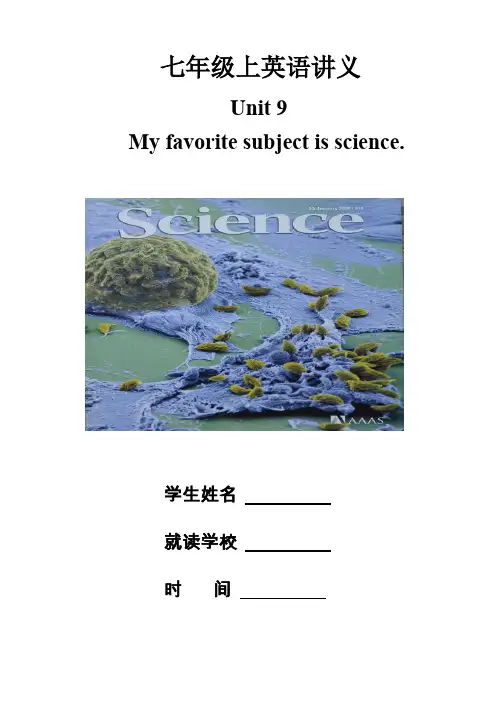
七年级上英语讲义Unit 9My favorite subject is science.学生姓名就读学校时间本章的知识清单知识框架表短语集萃1.sb. favorite subject/sport/fruit/teacher… 某人最喜欢的科目/运动/水果/老师…2. play games 做游戏3. on Monday/ Tuesday… 在星期一/ 星期二…4. from… to… 从…到…5. an art lessons for two hours 一节两小时的美术课6. have math/ history 上数学课/ 历史课7. play with… 和…玩耍8. want to do sth. 想做某事9. on Friday afternoon 在星期五下午句型汇总1. ---What’s your favorite subject? 你最喜欢的科目是什么啊?---My favorite subject is science.我最喜欢的科目是科学。
2. How’s your day? 你今天过得如何?3. Who’s your P.E. teacher? 你的体育老师是谁?4. That’s for sure. 的确如此。
5. ---Why does Bob like history? 鲍勃为什么喜欢历史?---Because it’s interesting. 因为它有趣。
6. ---When is your geography class? 你们的地理课是什么时候?---It’s on Monday and Friday. 它在星期一和星期五。
7. Is that OK with you? 那对你来说合适吗?语法全解——特殊疑问句1. 特殊疑问句的含义及构成:特殊疑问句是以疑问代词或疑问副词开头,对句子中的某一部分进行提问的句子。
它的基本结构是“疑问词+一般疑问句?,但是,如果疑问词在句子中作主语或主语的定语,就用“疑问词+陈述句?”,回答时应针对问句中的疑问代词或疑问副词,而不用yes或no来回答。
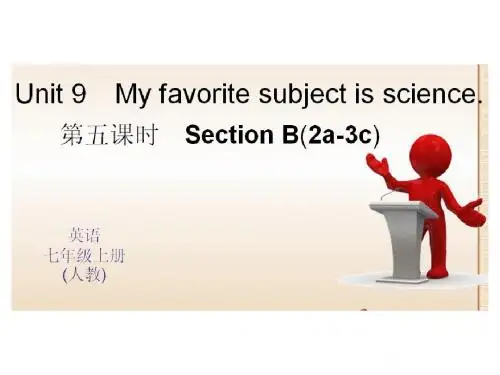
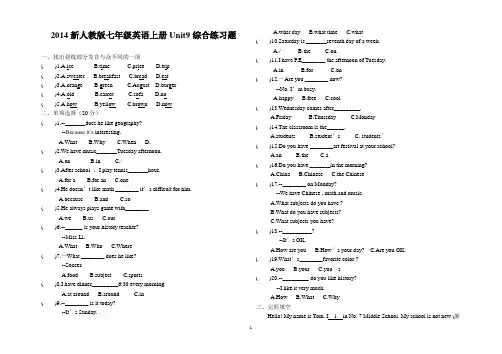
2014新人教版七年级英语上册Unit9综合练习题一、找出划线部分发音与众不同的一项( )1.A.ice B.time C.price D.trip( )2.A.sweater B.breakfast C.bread D.eat( )3.A.orange B.green C.August D.burger( )4.A.old B.carrot C.sofa D.no( )5.A.how B.yellow C.brown D.now二、单项选择(20分)( )1.--_______does he like geography?--Because it’s interesting.A.WhatB.WhyC.WhenD.( )2.We have music_______Tuesday afternoon.A.onB.inC./( )3.After school ,I play tennis_______hour.A.for aB.for anC.one( )4.He doesn’t like math ________ it’s difficult for him.A.becauseB.andC.so( )5.He always plays game with________A.weC.our( )6.--______ is your history teacher?--Miss Li.A.WhatB.WhoC.Where( )7.—What ________ does he like?--Soccer.A.foodB.subjectC.sports( )8.I have dinner_________6:30 every morning.A.at aroundB.aroundC.in( )9.--________ is it today?--It’s Sunday.A.what dayB.what timeC.what( )10.Saturday is _______seventh day of a week.A./B.theC.on( )11.I have P.E________ the afternoon of Tuesday.A.inB.forC.on( )12.—Are you ________ now?--No. I’m busy.A.happyB.freeC.cool( )13.Wednesday comes after_________.A.FridayB.ThursdayC.Monday( )14.The classroom is the______.A.studentsB.student’sC. students’( )15.Do you have ________art festival at your school?A.anB.theC.a( )16.Do you have _______in the morning?A.ChinaB.ChineseC.the Chinese( )17.--________ on Monday?--We have Chinese , math,and music.A.What subjects do you have ?B.What do you have subjects?C.What subjects you have?( )18.--__________?--It’s OK.A.How are youB.How’s your day?C.Are you OK.( )19.What’s________favorite color ?A.youB.yourC.you’s( )20.--_________ do you like history?--I like it very much.A.HowB.WhatC.Why三、完形填空Hello! My name is Tom. I 1 in No. 7 Middle School. My school is not new (新的) but very big. My teachers and classmates are 2 to me. I love 3 very much.Our first class 4 at 8:00. We have four lessons in the morning and two in the afternoon. We have 5 subjects like English, Chinese, math, art and P.E. My 6 subject is English. I also like art, but I don' t like geography 7 it's not very interesting. Do you think so?I often have lunch 8 my friends at school. Then we go to the library to 9 some books. After school, we like to play basketball. I have a good 10 at school. I love my school.( )1. A. be B. am C. is D. are( )2. A. cool B. nice C. new .D. welcome( )3. A. us B. her C. you D. them( )4. A. is B. are C. has D. have( )5. A. some B. much C. big D. middle( )6. A. first B. fine C. favorite D. right( )7 A. or B. but C. so D. because( )38. A. from B. with C. in D. to( )9. A. look B. see C. read D. watch( )10. A. party B. time C. photo D. subject四、根据语境,用恰当的疑问词填空,每空词数不限。
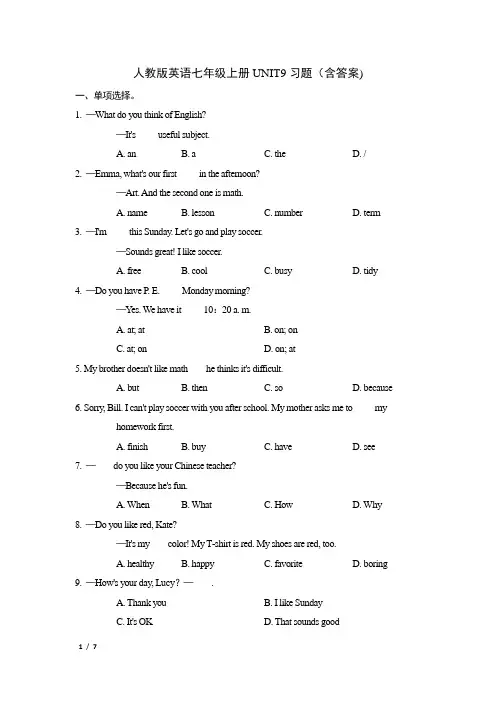
人教版英语七年级上册UNIT9习题(含答案)一、单项选择。
1. —What do you think of English?—It's ____ useful subject.A. anB. aC. theD. /2. —Emma, what's our first ____ in the afternoon?—Art. And the second one is math.A. nameB. lessonC. numberD. term3. —I'm ____ this Sunday. Let's go and play soccer.—Sounds great! I like soccer.A. freeB. coolC. busyD. tidy4. —Do you have P. E. ____ Monday morning?—Y es. We have it ____ 10:20 a. m.A. at; atB. on; onC. at; onD. on; at5. My brother doesn't like math____he thinks it's difficult.A. butB. thenC. soD. because6. Sorry, Bill. I can't play soccer with you after school. My mother asks me to ____ myhomework first.A. finishB. buyC. haveD. see7. —____do you like your Chinese teacher?—Because he's fun.A. WhenB. WhatC. HowD. Why8. —Do you like red, Kate?—It's my____color! My T-shirt is red. My shoes are red, too.A. healthyB. happyC. favoriteD. boring9. —How's your day, Lucy?—____.A. Thank youB. I like SundayC. It's OKD. That sounds good10. —History is really interesting. —____. I like it very much.A. Y ou, tooB. That's for sureC. I'm sorryD. Y ou're welcome二、完形填空。
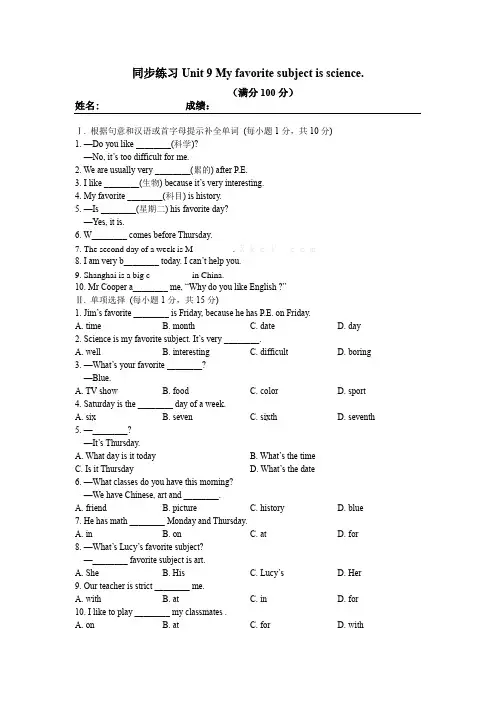
同步练习Unit 9 My favorite subject is science.(满分100分)姓名: 成绩:Ⅰ. 根据句意和汉语或首字母提示补全单词(每小题1分,共10分)1. —Do you like ________(科学)?—No, it’s too difficult for me.2. We are usually very ________(累的) after P.E.3. I like ________(生物) because it’s very interesting.4. My favorite ________(科目) is history.5. —Is ________(星期二) his favorite day?—Yes, it is.6. W________ comes before Thursday.7. The second day of a week is M________. X k b 1 . c o m8. I am very b________ today. I can’t help you.9. Shanghai is a big c________ in China.10. Mr Cooper a________ me, “Why do you like English ?”Ⅱ. 单项选择(每小题1分,共15分)1. Jim’s favorite ________ is Friday, because he has P.E. on Friday.A. timeB. monthC. dateD. day2. Science is my favorite subject. It’s very ________.A. wellB. interestingC. difficultD. boring3. —What’s your favorite ________?—Blue.A. TV showB. foodC. colorD. sport4. Saturday is the ________ day of a week.A. sixB. sevenC. sixthD. seventh5. —________?—It’s Thursday.A. What day is it todayB. What’s the timeC. Is it ThursdayD. What’s the date6. —What classes do you have this morning?—We have Chinese, art and ________.A. friendB. pictureC. historyD. blue7. He has math ________ Monday and Thursday.A. inB. onC. atD. for8. —What’s Lucy’s favorite subject?—________ favorite subject is art.A. SheB. HisC. Lucy’sD. Her9. Our teacher is strict ________ me.A. withB. atC. inD. for10. I like to play ________ my classmates .A. onB. atC. forD. with11. Linda has ________ friends in the school, but she doesn’t have ________ at home.A. any; someB. any; anyC. some; anyD. some; some12. —________ does she like English ?—Because it’s fun .A. WhyB. HowC. WhoD. What13. ________ is the fourth day of a week .A. ThursdayB. WednesdayC. FridayD. Sunday14. Mr Green is very strict and I’m usually very ________ after class.A. happyB. funC. tiredD. interesting15. We have Chinese ________ 8:00 ________ 9:00 in the morning .A. on; atB. from; toC. at; atD. from; forⅢ.Tom 1 up at 6:30 every morning and he 2 to school at 7:40. He 3 math at 8:30 and science at 9:30. English is his 4 subject. He 5 it because it’s really 6 . Mr Green is his math teacher. He has 7 at 12:00 at school. His music and P.E. classes are often in the afternoon. They are 8 . But he 9 not like history, because it’s 10 . He has seven classes on Monday, Tuesday and Thursday. He has six classes on Wednesday and Friday.Ⅳ. 句型转换(每小题2分,共10分)1. My favorite subject is science.(对划线部分提问)________ ________ ________ favorite subject?2. I like science because it’s interesting.(对划线部分提问)________ ________ you like science ?3. We have science on Thursday. (对划线部分提问)________ do ________ ________ science?4. Mr Li is my favorite teacher. (对划线部分提问)________ ________ your favorite teacher ?5. I like biology best.(改为同义句)________ ________ ________ is biology.Ⅴ. 根据汉语提示完成下列句子(每小题2分,共10分)1. His ________________(他最喜爱的运动) is running.2. Our teacher ________________________(对……要求严格) us.3. After class we play soccer ________________________ (一小时).4. We ________ ________(上数学课) every day.5. —________(为什么) do you like P.E.?—________(因为) it is relaxing.Ⅵ. 完形填空(每小题1分,共10分)Dear Jane,Thank you 1 your letter. It’s good that you 2 your school . I go to school 3 Monday to Friday. I have four classes in the morning 4 two classes in the afternoon. I am 5 after class. On Monday and Wednesday afternoon I play volleyball for 6 hours. On Tuesday afternoon 7 of us have a singing class. And on Thursday afternoon some 8computer class. On Friday afternoon I learn to speak English 9 my English teacher. On Saturdays and Sundays I don’t go to school. I am often with 10 father and mother.Love,Lin Mei1. A. of B. to C. on D. for2. A. like B. see C. look D. watch3. A. for B. to C. from D. on4. A. or B. and C. but D. also5. A. busy B. tired C. fun D. difficult6. A. two B. one C. a D. an7. A. much B. some C. one D. only8. A. has B. plays C. play D. have9. A. and B. with C. that D. or10. A. I B. me C. my D. usⅦ. 阅读理解(每小题2分,共20分)ADick and Ellen come from America. Now they are in Tianjin. Every morning they get up very early(早). Then they go to work by car. They start their work at 8:30. They are very busy. They have lunch at 12:30. After lunch they work again. They finish their work at 5:30 p.m. In the evening they take Chinese lessons. They want to learn Chinese. They want to talk with Chinese people. They often say “Chinese people are very friendly”. They like to stay in China and they like to work with Chinese people.6. Where are Dick and Ellen now?A. In America.B. In Beijing.C. In Tianjin.D. In England(英国).7. Do they get up very late(晚) every morning?A. Yes, they do.B. No, they don’t.C. No, they do.D. Yes, they don’t.8. When do they begin to work?A. At 8:00.B. At 8:30.C. At 9:00.D. At 12: 309. What do they do in the evening?A. Stay at home.B. Watch TV.C. Take Chinese lessons.D. Go to work10. Why do they want to learn Chinese?A. Because they like Chinese.B. Because they like China.C. Because they want to talk with Chinese people.D. Because they want to stay in China.B阅读对话,根据对话内容填表。
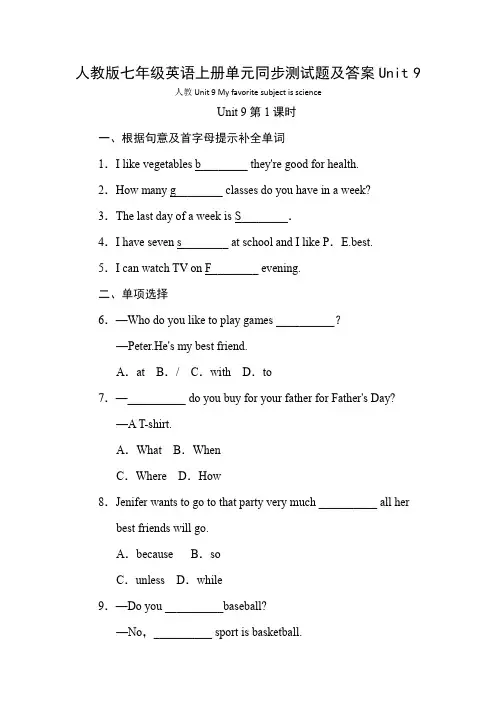
人教版七年级英语上册单元同步测试题及答案Unit 9人教Unit 9 My favorite subject is scienceUnit 9第1课时一、根据句意及首字母提示补全单词1.I like vegetables b________ they're good for health.2.How many g________ classes do you have in a week?3.The last day of a week is S________.4.I have seven s________ at school and I like P.E.best.5.I can watch TV on F________ evening.二、单项选择6.—Who do you like to play games __________?—Peter.He's my best friend.A.at B./ C.with D.to7.—__________ do you buy for your father for Father's Day?—A T-shirt.A.What B.WhenC.Where D.How8.Jenifer wants to go to that party very much __________ all her best friends will go.A.because B.soC.unless D.while9.—Do you __________baseball?—No,__________ sport is basketball.A.like;my like B.favorite;I favoriteC.like;my favorite D.like;I favorite10.Listen up,everybody!Show(展示) me your license(证件).Don't ask __________.Just do it!A.what B.when C.how D.why11.—__________ is Tom's favorite teacher?—Mr.Wang.A.When B.How C.Who D.Where12.We __________ computer classes in May.A.haven't B.don't haveC.doesn't have D.hasn't13.—How is your day?—__________.A.Thank you B.Not at allC.Great D.Sorry14.—__________ is your history class?—On the morning of Monday.A.Who B.What C.Why D.When15.—Mr.Tang's class is very interesting.—__________.We all like his classes very much.A.That's for sure B.I don't think soC.That's OK D.I'll take it三、用because,so,and,then,after或but填空16.I like English,__________ I like my English teacher,too. 17.I have a soccer,__________ I can't play it.18.She likes music__________ she thinks it's interesting. 19.Math is useful,__________ it's very difficult.20.We don't have computer lessons,__________ we can't play computer games.21.They often play basketball __________ school.22.—I think John likes strawberries.—OK.Let's buy some strawberries __________.23.I can't play with you__________ I have a math lesson in the afternoon.24.I often play sports __________ supper.25.I don't go to school __________ I am ill.四、补全对话A:Hello,Bob!B:Hi,Jenny!__________26A:OK!Bob.__________27B:Chinese.A:__________28B:Yes,I do.It's my favorite subject.A:Really?I like Chinese,too.B:__________29A:Mrs.Smith.Who is your Chinese teacher?B:Oh,my Chinese teacher is Ms.Brown.A:Do you like her?B:Yes,I do.__________30 And she is kind to us.答案一、1.because 2.geography 3.Saturday 4.subjects5.Friday二、6.C点拨:用成分分析法。
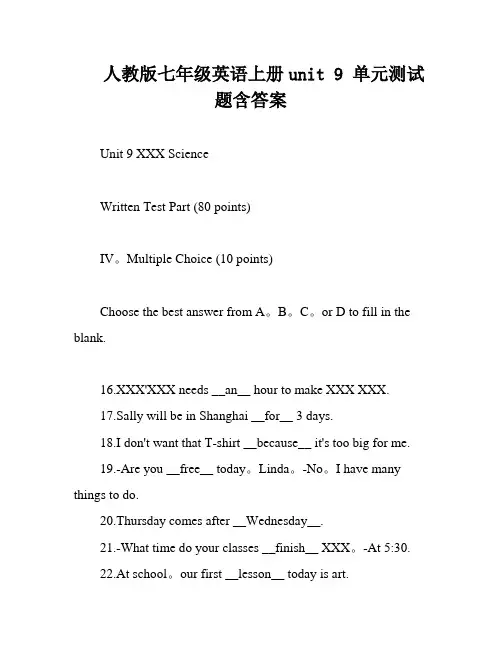
人教版七年级英语上册unit 9 单元测试题含答案Unit 9 XXX ScienceWritten Test Part (80 points)IV。
Multiple Choice (10 points)Choose the best answer from A。
B。
C。
or D to fill in the blank.16.XXX'XXX needs __an__ hour to make XXX XXX.17.Sally will be in Shanghai __for__ 3 days.18.I don't want that T-shirt __because__ it's too big for me.19.-Are you __free__ today。
Linda。
-No。
I have many things to do.20.Thursday comes after __Wednesday__.21.-What time do your classes __finish__ XXX。
-At 5:30.22.At school。
our first __lesson__ today is art.23.-What color __does__ your sister __like__。
-White.24.-__Who__ can make salad。
-XXX.V。
XXX (30 points)Read XXX.XXX subject is science。
I like science because it is XXX I learn a lot of things about the world and how it works。
I learn about the human body。
animals。
plants。
and the XXX I also learn about space and the s.My science teacher is very good。
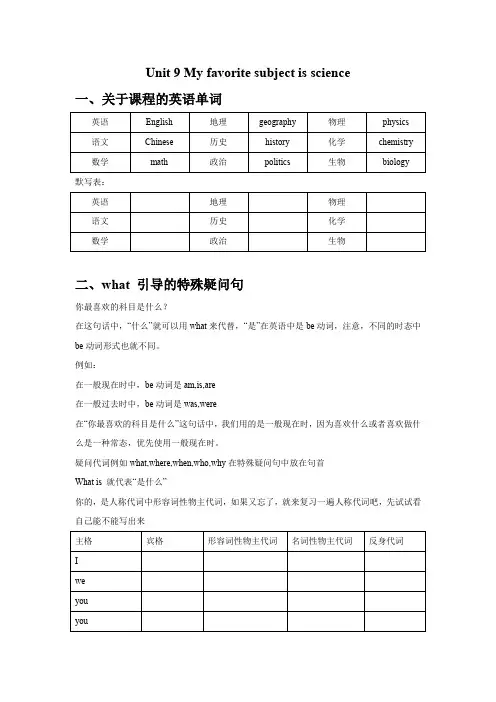
Unit 9 My favorite subject is science一、关于课程的英语单词默写表:二、what 引导的特殊疑问句你最喜欢的科目是什么?在这句话中,“什么”就可以用what来代替,“是”在英语中是be动词,注意,不同的时态中be动词形式也就不同。
例如:在一般现在时中,be动词是am,is,are在一般过去时中,be动词是was,were在“你最喜欢的科目是什么”这句话中,我们用的是一般现在时,因为喜欢什么或者喜欢做什么是一种常态,优先使用一般现在时。
疑问代词例如what,where,when,who,why在特殊疑问句中放在句首What is 就代表“是什么”你的,是人称代词中形容词性物主代词,如果又忘了,就来复习一遍人称代词吧,先试试看自己能不能写出来答案:所以,你最喜欢的科目就是your favorite subject现在把整个句子连起来:What is your favorite subject?你可以这样回答:My favorite subject is English/Chinese/math...三、... is your favorite...在这个句型中,问的是关于你最喜欢的什么事,人,或者物例如:What is your favorite job?你最喜欢的工作是什么?My favorite job is doctor.我最喜欢的工作事医生。
Who is your favorite teacher?你最喜欢的老师事是谁?My favorite teacher is Mr. Huang.我最喜欢的老师是黄老师。
What is her favorite subject?她最喜欢的科目是什么?Her favorite subject is music.她最喜欢的科目是音乐。
Where is your favorite place?你最喜欢的地方是哪?My favorite place is my home.我最喜欢的地方是我家。
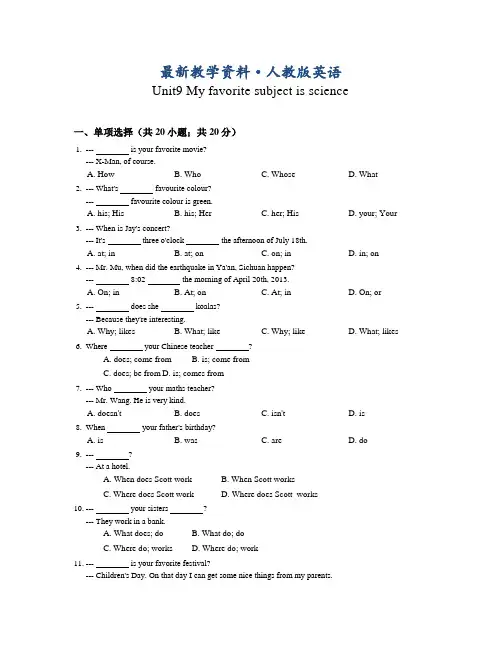
最新教学资料·人教版英语Unit9 My favorite subject is science一、单项选择(共20小题;共20分)1. --- is your favorite movie?--- X-Man, of course.A. HowB. WhoC. WhoseD. What2. --- What's favourite colour?--- favourite colour is green.A. his; HisB. his; HerC. her; HisD. your; Your3. --- When is Jay's concert?--- It's three o'clock the afternoon of July 18th.A. at; inB. at; onC. on; inD. in; on4. --- Mr. Mu, when did the earthquake in Ya'an, Sichuan happen?--- 8:02 the morning of April 20th, 2013.A. On; inB. At; onC. At; inD. On; or5. --- does she koalas?--- Because they're interesting.A. Why; likesB. What; likeC. Why; likeD. What; likes6. Where your Chinese teacher ?A. does; come fromB. is; come fromC. does; be fromD. is; comes from7. --- Who your maths teacher?--- Mr. Wang. He is very kind.A. doesn'tB. doesC. isn'tD. is8. When your father's birthday?A. isB. wasC. areD. do9. --- ?--- At a hotel.A. When does Scott workB. When Scott worksC. Where does Scott workD. Where does Scott works10. --- your sisters ?--- They work in a bank.A. What does; doB. What do; doC. Where do; worksD. Where do; work11. --- is your favorite festival?--- Children's Day. On that day I can get some nice things from my parents.A. WhatB. WhenC. WhereD. Why12. Yao Ming is my favourite basketball player. I really like .A. heB. himC. hisD. her13. --- When did this accident happen?--- It happened six o'clock the afternoon of last Monday.A. at; inB. in; onC. about; atD. at; on14. My family always have a party the evening of October 1, the party starts 8:00 p.m.A. at; inB. in; onC. at; onD. on; at15. --- Why he like pandas?--- Because it's from China.A. isB. areC. doD. does16. --- Where from?--- I come from China.A. are you comeB. do you comeC. did you comeD. are you coming17. --- your father?--- He's a teacher.A. WhatB. HowC. WhoD. What's18. How old your cousin brothers?A. areB. amC. isD. were19. --- When do you dinner?--- At 6:30 P.M.A. havingB. eatingC. eatD. has20. --- Where does she ?--- She lives in Sydney.A. livesB. livingC. liveD. is living二、单词拼写(单句首字母填空)(共20小题;共20分)21. --- What is your favourite subject?--- It's s .22. Our g teacher is Mr. Lu. He tells us some interesting places(地方).23. Now teenagers are not interested in h . They know less about the old days.24. M is the second day of a week.25. It's F today.26. We don't go to school on S or Sunday.27. The third day of the week is T .28. W is the fourth day of a week.29. It's a u book. You can learn a lot from it.30. T is the fifth day of the week.31. There are four s labs in the building.32. We can learn about famous mountains and rivers in g class.33. China is a country with a very long h .34. Tuesday comes after M .35. We go to school from Monday to F .36. In western countries, people think Sunday is the beginning of a week, and S is the last day ina week.37. The third day of the week, T is between Monday and Wednesday.38. The day before Thursday is W .39. The Internet is becoming very u for language learning.40. The day after Wednesday is T .三、单词拼写(根据中文提示拼写单词)(共20小题;共20分)41. If you learn even a little English, you will find it (有用的).42. It's hard (完成) the work in such a short time.43. John looks (酷的) in the new windbreaker.44. I like to play ping-pong on (星期日) morning.45. We have six (课) every day.46. Today I'm very busy, but she is (空闲的).47. Her favourite (科目) is physics.48. Boys are always interested in (科学).49. Do you know the (历史) of your country?50. --- Which subject do you like best?--- (地理).51. We will go shopping this (星期六). Can you go with us?52. We usually have some PE activities on (星期五) afternoon.53. Today is (星期二), February 18th. I'm on duty.54. It's ( 星期三 ) today.55. What's Maria's (最喜欢) subject?56. At last Jim found Chinese very (有用).57. He (完成) his homework at 6 p.m. every day.58. Which do you think is the (酷的) thing in your room?59. Miss Yang likes reading on S (星期日).60. Today we have six (课).四、完形填空(共10小题;共15分)It's eight forty now. This is a 61 . You can see some girls, some boys 62 a woman in it. Tom is in the first row(排). He 63 golden(金色的) hair and blue eyes. He is from 64 , and his English is very good. He loves China very much. He is a new student. He is doing his 65 at his desk. The girls and the other boys are Chinese. They can 66 a little English. They are talking 67 English. The woman is their English 68 . She is a kind woman. She is 69 some new words on the blackboard. She is having an English 70 .61. A. room B. school C. classroom62. A. but B. with C. and63. A. has B. is C. likes64. A. America B. China C. Japan(日本)65. A. housework B. work C. homework66. A. speak B. say C. talk67. A. of B. in C. with68. A. teacher B. friend C. classmate69. A. reading B. doing C. writing70. A. shop B. work C. class五、阅读理解(共18小题;共36分)AIn England, school begins at 8:55 a.m. At 9:00 a.m., students go to a big hall to listen to stories, sing a song and pray(祈祷). The first lesson begins at 9:20 a.m. Then students have their morning break from 10:20 to 10:35 a.m. They can eat something or play games in the playground.From 12:00 to 1:10 p.m., they have lunch. After lunch, they play games in the playground or go to lunchtime clubs.Class begins at 1:30 in the afternoon. Students learn one or two subjects such as science, history, art or IT. At 3:45 p.m., a school day is over.71. Children stay at the big hall for .A. 35 minutesB. 30 minutesC. 25 minutesD. 20 minutes72. At 10:25 a.m., students are .A. prayingB. doing some readingC. playing gamesD. having an art lesson73. What do students usually do after lunch?A. They listen to stories.B. They wait in line in the hall.C. They go to lunchtime clubs.D. They sing an English song.74. Students have in the afternoon.A. English and mathsB. English and scienceC. maths and historyD. science and history75. The best title of the passage is .A. Classes in British SchoolB. School Life in EnglandC. Children's Life in EnglandD. Ways to Go to School in EnglandBLook at the poster(海报) below:Tickets sold at canteenFancy dress—come as your favourite TV characterPrizes to be wonCanteen open for snacks and soft drinksNotes:● High schools in England hold dances, calle d socials, about once a term. They are called socials because students are socializing with each other.● Snacks include food like chips and chocolate bars. Soft drinks are fizzy drinks like lemonade and coca cola.● Fancy dress is when you get dressed up as somebody or something else. You don't get dressed in your normal clothes. Fancy dress parties are common for both young and older people.76. The poster mainly talks about .A. a new movie at schoolB. a dance party at schoolC. an outdoor activityD. a fashion show at school77. Which of the following is Not true in this Social?A. You can dance and make friends.B. You can buy snacks or coke as you wish.C. You can see movies there.D. You can win the prizes in the party.78. Where can you buy the ticket?A. At the schoolyard.B. At the cinema.C. At the Students' Club.D. At the canteen.79. What do you have to wear?A. Jeans.B. Fancy dress.C. School uniforms.D. Party dresses.CWaiter: Good morning, sir! Can I help you?Mr. Black: Yes, please. What should I buy for you, Ann?Ann: A hamburger and some French fries.Mr. Black: Would you like something to drink?Ann: A glass of coke.Man: With ice?Ann: Yes, thank you.Mr. Black: Tom, what would you like?Tom: I'm not hungry. Just a big glass of coke with ice, please.Mr. Black: No food?Tom: No. What would you like, Dad?Mr. Black: I'd like some rice and fish, and a glass of coke with ice.80. How many people are there in the dialogue?A. Three.B. Four.C. Five.D. Six.81. Where do you think this dialogue may happen(发生)?A. At school.B. At home.C. In a restaurant.D. In a shop.82. What does Ann want to drink?A. Coke.B. Tea.C. We don't know.D. Water.83. Does Tom want to eat anything?A. Yes.B. No.C. We don't know.D. Sure.84. Mr. Black wants to eat .A. some French friesB. a hamburgerC. some rice and fishD. fishDChinese people legally enjoy over 115 days off including 104 days of weekends and 11 days of festivals. Workers have 5 to 15 days of paid leave. Students and teachers have summer and winter vacations for about three months. The summer vacation in China usually starts around July 1st and ends around August 31st. The winter vacation usually falls in January or February according to the date of the Spring Festival.China has 7 legal(法定的) holidays in a year. They are New Year's Day, the Spring Festival, Qingming Festival, May Day, the Dragon Boat Festival, the Mid-Autumn Festival and National Day. At the festivals, all Chinese people will be on vacation.85. Students and teachers can enjoy summer and winter vacations for about days.A. 30B. 60C. 90D. 12086. How many days of paid leave do workers have?A. 5.B. 10.C. 15.D. 5 to 15.87. Which of the following is true according to the passage?A. The Dragon Boat Festival comes before May Day.B. At the festivals, all Chinese people will stay at home.C. The Mid-Autumn Festival is China's legal holiday.D. Chinese people legally enjoy less than 115 days off.88. From the passage, we know .A. only Chinese people have legal holidaysB. When to start the winter vacation usually depends on the Spring FestivalC. New Year's Day is the most important holiday in ChinaD. China has 6 legal holidays in a year六、阅读与表达(判断式)(共5小题;共10分)I started this QQ group named CZ (Chenzhou) English club two months ago. It has twenty-eight members now. It is an English chatting place. Now we need some more friends who are interested in chatting in English.Please remember the rules for our group members.★ Everyone in our group must speak in English with each other. Don't keep silent for ten days.★ The main aim of this group is to improve our English.★ Chatting in English doesn't mean we pay more attention to English. I think Chinese is my first language and it's the most important.★ Don't send advertisements or any pictures here.If you don't follow the rules above, we will ask you to leave.根据短文内容,判断正误,正确的为T,错误的为F。
新人教版七年级上册英语第九单元精选练习题附答案Unit 9My favorite subject is science.第一课时Section A(1a~2d)01基础过关Ⅰ.根据图片提示写出下列学科的英文名称。
1. ________2.________3.________4.________5.________Ⅱ.根据句意及汉语提示填写单词。
6. Her ________(最喜欢的) color is white.7. I like playing basketball ________(因为) it's fun.8. Our school has a music festival this ________(周六).9. ________(历史) is an interesting subject.10. ________(星期五) is the sixth day of a week.Ⅲ.单项选择。
( )11.I think ________ art is ________ interesting subject.A. a;aB. the;/C. an;anD. /;an( )12.Some students don't like science because they think it's________.A. interestingB. funC. boringD. relaxing( )13.-What's your favorite________?-Saturday.A. sportB. dayC. subjectD. month( )14.—Why do you like English?—________ it's interesting.A. BecauseB. AndC. ButD. So( )15.—I think Ms.Smith is a good teacher.—________.All the students like her.A. That's for sureB. I don't knowC. You're welcomeD. That sounds funⅣ.按要求完成下列句子, 每空一词。